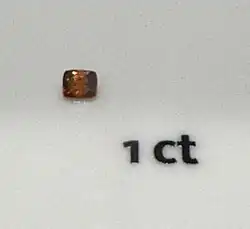Kyawthuite
| Kyawthuite | |
|---|---|
 Kyawthuite sample on display at the Natural History Museum of Los Angeles County | |
| General | |
| Category | Oxide mineral |
| Formula | BiSbO4 |
| IMA symbol | Kyw[1] |
| Crystal system | Monoclinic |
| Crystal class | Prismatic (2/m) (same H-M symbol) |
| Space group | I2/c |
| Unit cell | a = 5.46 Å, b = 4.89 Å c = 11.85 Å, β = 101.20° (approximated); Z = 4 |
| Identification | |
| Mohs scale hardness | 5 1/2 |
| References | [2][3] |
Kyawthuite (/ˈtʃɜːrˌtuːaɪt/)[4] is a rare mineral[2] with formula BiSbO4.[3] It is a natural bismuth antimonate, in which bismuth has oxidation state +3, and antimony oxidation state +5.[5]
Description
Kyawthuite is monoclinic, with space group I2/c, and is isostructural with clinocervantite,[2] its trivalent-antimony-analogue.[6] Kyawthuite is an antimony-analogue of clinobisvanite.[7]
Occurrence
Kyawthuite was discovered in the vicinity of Mogok in Myanmar, an area famous for its variety of gemstone minerals,[8] in 2010 and was subsequently identified as being a new specimen by Dr. Kyaw Thu. The International Mineralogical Association officially recognised kyawthuite as a new mineral in 2015.[9]
Only one 0.3-gram sample of the naturally occurring form of this mineral is documented, and it is stored and on display at the Natural History Museum of Los Angeles County.[10] [11]

References
- ^ Warr, L.N. (2021). "IMA–CNMNC approved mineral symbols". Mineralogical Magazine. 85 (3): 291–320. Bibcode:2021MinM...85..291W. doi:10.1180/mgm.2021.43. S2CID 235729616.
- ^ a b c "Kyawthuite: Kyawthuite mineral information and data". Mindat.org. Retrieved 2016-03-04.
- ^ a b Kampf, A.R., Rossman, G.R. and Ma, C. (2015) Kyawthuite, IMA 2015-078. CNMNC Newsletter No. 28, December 2015, 1863; Mineralogical Magazine 79, 1859–1864
- ^ Julien Miquel (2024-03-29). How to Pronounce Kyawthuite (CORRECTLY!). Retrieved 2025-05-05 – via YouTube.
- ^ Kampf, Anthony R.; Rossman, George R.; Ma, Chi; Williams, Peter A. (2017-06-01). "Kyawthuite, Bi3+Sb5+O4, a new gem mineral from Mogok, Burma (Myanmar)". Mineralogical Magazine. 81 (3): 477–484. doi:10.1180/minmag.2016.080.102. ISSN 0026-461X.
- ^ "Clinocervantite: Clinocervantite mineral information and data". Mindat.org. Retrieved 2016-03-09.
- ^ "Clinobisvanite: Clinobisvanite mineral information and data". Mindat.org. Retrieved 2016-03-09.
- ^ "Mogok Township, Pyin-Oo-Lwin District, Mandalay Division, Myanmar - Mindat.org". Mindat.org. Retrieved 2016-03-04.
- ^ Puiu, Tibi (2025-07-30). "Meet the world's rarest mineral. It was found only once". ZME Science. Retrieved 2025-08-06.
- ^ Luntz, Stephen (26 January 2023). "There Is Only One Specimen Of The Rarest Mineral On Earth". IFLScience. Retrieved 30 January 2023.
- ^ Starr, Michelle, The World's Rarest Mineral Is So Rare It's Only Ever Been Found Once, Science Alert, November 29, 2024